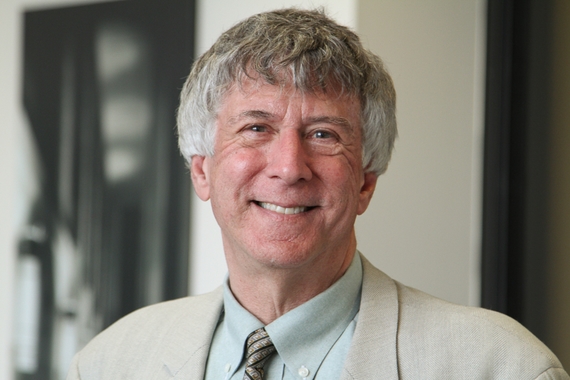A Leader in Twin Research Retires

In February 2023, Regents Professor William (Bill) Iacono retired from the Department of Psychology after 40 years as a faculty member at the University of Minnesota (UMN). Iacono’s contributions to the field of behavioral genetics via twin and family study designs, specifically examining schizophrenia, common mental disorders and substance abuse, are immense and his legacy is well-solidified through the Minnesota Center for Twin and Family Research (MCTFR), which he co-founded.
Iacono always had an interest in the genetic propensity that underlies human behavior, realizing early on that studying twins uniquely allows one to tease out how genes and environment work together to influence behavior. As a graduate student in the UMN Department of Psychology in the 1970s, Iacono completed a dissertation utilizing a study to explore the genetic basis of schizophrenia by studying biomarkers associated with schizophrenia in twins. Such research was just gaining traction at the time, beginning to overtake the prevailing belief that environment was the predominant factor that influenced behavior. With the University being one of the leading institutions in the study of behavioral genetics, though, Iacono’s research flourished in fertile ground. He trained under UMN faculty members Thomas Bouchard, David Lykken, Irving Gottesman, Auke Tellegen, and Norman Garmezy, all of whom were conducting behavioral genetics research, examining family influences on the development of psychopathology. After completing his degree in 1978, and working in his first faculty position at the University of British Columbia where he conducted genetically-informed, longitudinal studies of first-episode psychosis, Iacono realized “how special the University of Minnesota’s emphasis on behavioral genetics was.” He eventually made his way back to Minnesota, officially joining his former mentors in the Department of Psychology as a colleague in 1985. He reflected, “to find a core group of people who had this interest and expertise [in behavioral genetics] was rare. I felt fortunate to have graduated from the University of Minnesota…[Having the opportunity to] come back and join all these people who were my mentors made a difference in my thinking and professional development.”
A few short years later in 1987, Iacono and colleagues Matt McGue and David Lykken co-founded the Minnesota Twin Family Study (MTFS). In the late 1980s, the National Institute on Drug Abuse (NIDA) was interested in ramping up its biologically based studies of human behavior related to substance abuse. At the time, NIDA had a robust portfolio of animal-based studies, but very little human research. Iacono, McGue, and Lykken submitted a proposal. According to Iacono, “it was natural for us to plug in.” Their initial proposal was funded, as well as numerous subsequent proposals, leading them to develop the MCTFR, now operating in its 36th year. Over 10,000 family members have contributed to MCTFR research projects over the years, producing arguably the most robust repository of longitudinal data on twins, adoptees, and their parents in the world.
In reflecting back on his decades-long research contributions, Iacono stated,
One of the things that I’ve been able to do is provide insights on the etiology of behavior, psychopathology and substance abuse, and the consequences of these problems that people have. The way people had been thinking about it was not properly informed. They were not using genetically informed, longitudinal designs. Many of the variables, outcomes, and behavioral problems [people] have…[such phenomena are actually a] predisposition to develop those problems [rather than a consequence of them]. With a genetically informed longitudinal sample, you can start to see that. For example, when people find that brain anomalies are present in those who use drugs, they naturally think the brain finding is an outcome caused by drug use. Often, however, it is a risk factor reflective of the biological predisposition to abuse drugs. An important part of my work has been showing that before psychopathology develops, genetically influenced biomarkers can be identified in at-risk individuals that predict their future mental health and psychological maladjustment.
Iacono also noted that there is still much to be understood about what mechanisms are involved in the etiology of behavior, allowing us to better facilitate interventions and possibly even prevent behavioral problems. For instance, if one twin has schizophrenia and the other does not, how did that happen? With this example, Iacono described that perhaps one twin had a high fever as a child, a birth complication, or a traumatic experience of bullying. Presently researchers can account for these risk factors, but they cannot yet understand how they all work together to produce a particular outcome. According to Iacono, “That’s the next step…we need more specific ideas on how to fix these problems and develop an intervention.”
When asked where he sees the science going in the next 5 to 10 years, Iacono described that everything is going in the direction of more sophisticated quantitative methods. Iacono believes that artificial intelligence will have an enormous impact on our ability to organize information and synthesize it in a way that helps us to understand how to answer the big questions we are asking. To best prepare for this reality, Iacono recommended that early-career researchers get as much methodological training as possible and that they continue to stay up to date on new methods that come out each year. Additionally, Iacono noted that multidisciplinary training is key to the future. He stated, “There is a major need for well-trained scientists who can integrate information across disciplines and go beyond a single point of focus to understand how they can use information from multiple sources and types in order to get a comprehensive picture of what is going on. Psychology still produces some of the best scientists capable of doing this sort of thing….I’m optimistic for the science of behavior and what the future holds over the next couple of decades.”
In retirement, Iacono plans to be engaged in research, albeit to a more limited extent, and he is interested in continuing to help train and mentor young people. With his increased free time, he intends to be out in the wilderness, further honing his skill in nature photography, and he is looking forward to spending more leisure time with his family. When asked for a final reflection on his career at the University of Minnesota, he concluded, “I feel like I was born and raised to be a Minnesota graduate and faculty member…there isn’t any other place where I could have done what I did and [where I] would have enjoyed it as much as I did.” Congratulations, Bill; we at the University of Minnesota are grateful you joined us all those years ago.


